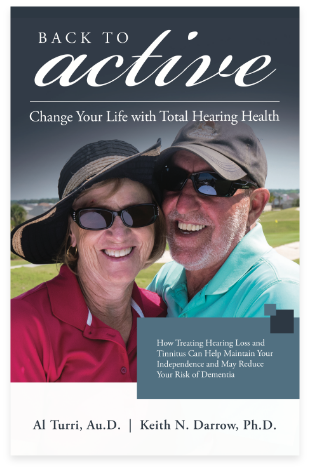Gifts are available on a first come, first serve basis. One gift per household.

The Connection Between Cognitive Decline and Hearing Loss
Hearing health is vital to overall wellness, and its importance only increases as we age. You may already be aware that your hearing affects your balance and your ability to communicate with family and friends, but did you know that it also dramatically impacts your brain health? In a 2017 report, hearing loss was reported as the number one modifiable risk factor to reduce the risk of dementia and other forms of cognitive decline.
Hearing loss and a decline in cognitive function have long been considered normal parts of the aging process, and while that is true, recent research indicates that both can be treated and slowed down. Understanding the connection between cognitive decline and hearing loss is the first step in seeking treatment and getting yourself on a path to lead a healthier, more active lifestyle.
How are hearing loss and cognitive decline connected?
Johns Hopkins University researched the effects of hearing loss on older adults in a study that followed a group of older adults over the span of six years. The group underwent a series of cognition tests over the course of the study, revealing that the cognitive abilities of adults with hearing loss declined 30-40% faster than those without hearing loss.
While researchers have been able to identify a link between hearing loss and dementia, there are still several theories as to how and why they are connected. There are three major theories being explored by doctors today. These are:
- Cognitive Load: When hearing loss goes untreated for too long, the brain can become exhausted and overworked from constant strain and overcompensation. When the brain is overworked for an extended period of time, it can begin to lose overall function. If you’ve ever felt exhausted and strained from spending time with family and friends in a crowded social environment, hearing loss may be a factor. Schedule a consultation with an audiologist to ensure your hearing health is protected.
- If You Don’t Use It, You Lose It: Studies have shown that brain cells can shrink or become damaged from a lack of stimulation. The brain is responsible for your ability to receive and process sounds, so when your ability to hear is damaged, the cells responsible for managing that information are left unstimulated. This cell shrinkage can contribute to dementia and other forms of cognitive decline.
- The Dangers of Social Isolation: The effects of hearing loss go beyond its impact on the body. Many people who experience hearing loss also report feelings of social isolation. When a person has trouble hearing, they may withdrawal from conversations and social situations to avoid embarrassment and frustration. This isolation can lead to an under stimulated brain, which can result in feelings of anxiety, depression, and other forms of cognitive decline.
How to protect your hearing and your brain
The good news is that it’s never too late to take your brain or hearing health into your own hands. The first step is to get a hearing screening to determine whether or not you are suffering from hearing loss. By meeting with a licensed audiologist, you can get a clinically based evaluation and customized treatment plan that addresses your hearing health needs, which may or may not involve the use of hearing devices.
Audiologists don’t just diagnose and treat hearing loss, they are qualified to address other hearing-related problems such as tinnitus, balance disorders, and more.
Visit The Villages Health Audiology to find the right hearing health provider for your unique lifestyle.
More Resources
